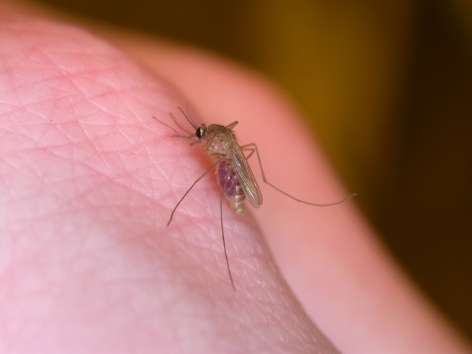After a slow start to mosquito season, floods may boost population, according to entomologists

The next few weeks could bring a rise in mosquito populations as floodwaters recede across the state, a pair of Iowa State University entomologists warned this week.
Mosquito numbers this summer have been trailing last year's totals, but Iowans shouldn't expect that to continue, said Brendan Dunphy, a research associate in entomology. Recent flooding in Iowa could leave behind plenty of standing water, which is prime real estate for mosquitoes to lay eggs.
"The running dogma is that with all this rain, the mosquito population should explode at any time now," Dunphy said. "Frankly, I'm a little surprised that it hasn't done so already."
Any increase in mosquitoes won't happen immediately, he said. Rather, it takes around two weeks for mosquitoes to lay eggs and for the immature mosquitoes to develop into adults.
Traps run by the ISU Medical Entomology Laboratory averaged roughly twice as many mosquitoes in June 2013 as in June 2014. The statewide weekly average reached about 600 mosquitoes per trap during June 2013 while the highest average this year has been about 300 mosquitoes per trap.
Dunphy cautioned that those are statewide averages, and some mosquito populations at the local level may not have seen such a marked difference between 2014 and 2013. But he said there's little question that last year was a heavier year for mosquitoes, at least to this point in the summer. That could have been due to this spring's late frost wiping out immature mosquitoes. Another possibility is that low mosquito numbers during the late summer last year may have resulted in fewer eggs deposited on the landscape, he said.
But those depressed numbers may not last much longer. Data collected by the medical entomology laboratory during flood years such as 2008 or 2010 show a consistent rise in mosquito numbers. For instance, during the weeks following widespread floods in 2010, traps in western Iowa attracted up to 3,000 mosquitoes, offering a glimpse of what might be in store for Iowans this year.
"What we've experienced so far probably isn't a good indicator of what's going to happen in July," said Lyric Bartholomay, an associate professor of entomology and director of the medical entomology lab.
Bartholomay recommended that Iowans who want to avoid mosquitoes rid their lawns of all standing water to cut down on the available habitat. She said flower pots, gutters and bird baths all have the potential to attract mosquitoes. She also said wearing long sleeves and pants can help, although that's not always practical during hot summer months. Mosquito repellants provide some protection as well as staying indoors around dusk, when mosquito activity is often the heaviest, she said.
Provided by Iowa State University


















